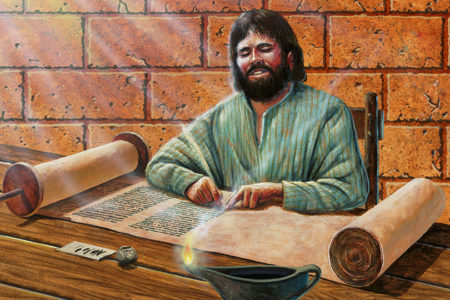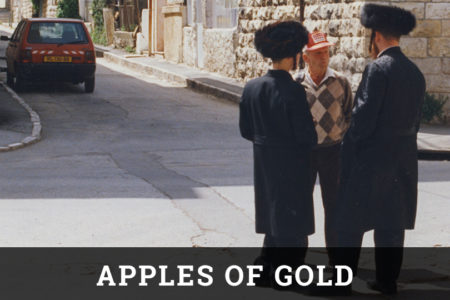Messiah in the Psalms
In the Hebrew Scriptures, the 150 Psalms are divided into five books. These poems of prayer and praise cover many themes and are often stated in terms of human experience. They tell of the victories, heartaches, and sufferings of the people of Israel.
One of the predominant themes in the Psalms is that of the Messiah. About ten percent, or 16 of the 150 Psalms, are classified as messianic. They are Psalms 2, 8, 16, 22, 23, 24, 40, 41, 45, 68, 69, 72, 89, 102, 110, and 118. In addition, many of the other Psalms, while not strictly messianic in nature, refer to Christ. The various writers related much about His person, life, rejection, suffering, and resurrection. The messianic Psalms were often quoted and further explained in the New Testament.
This article examines a few of the messianic Psalms, along with some messianic statements from other Psalms.
The Person of Christ in the Psalms
Psalm 110
Verse 1 affirms that the Messiah is God, for He is called “Lord,” a title of deity. If the Lord has a Lord, we are forced to one of two conclusions: polytheism (more than one god) or a triune God (one God in three persons). The latter is true. This is the beginning point in understanding the triune nature of God.
Psalm 110:1 was quoted by Matthew, Mark and Luke, the writers of the Synoptic Gospels. Peter also quoted this verse on the day of Pentecost: “This Jesus hath God raised up, whereof we all are witnesses. Therefore, being by the right hand of God exalted, and having received from the Father the promise of the Holy Spirit, he hath shed forth this, which ye now see and hear. For David is not ascended into the heavens; but he saith himself, The LORD said unto my Lord, Sit thou on my right hand, Until I make thy foes thy footstool. Therefore, let all the house of Israel know assuredly, that God hath made that same Jesus, whom ye have crucified, both Lord and Christ” (Acts 2:32–36).
Peter did not doubt that Jesus was Israel’s Messiah. The fact that His foes would one day be made His footstool was clearly taught by this Jewish apostle. Peter quoted Psalm 110:1 to prove that Christ was part of the Godhead and that He literally fulfilled the prophecy of this Psalm. The end result was that the Holy Spirit touched many lives, and three thousand people came to the Lord that day.
Verse 1 also teaches that the Messiah will defeat the enemies of God. Not only is Jesus God, but He will one day rule the world, making His enemies His footstool. This promise was twice quoted by the writer of Hebrews (1:13 and 10:13). Jesus will ultimately defeat Satan and be King of kings and Lord of lords.
He is the eternal High Priest: “The Lᴏʀᴅ hath sworn, and will not repent, Thou art a priest forever after the order of Melchizedek” (v. 4). This verse authenticates Jesus’ eternal high priesthood, a fact that is confirmed in Hebrews 5:6, 6:20, and chapter 7.
Psalm 2
Psalm 2 also clearly describes the person of Christ. He is called the Lord’s “anointed” (Messiah, v. 2), “king” (v. 6), and “Son” (v. 7). Verses 8 and 9 clearly predict that He will conquer the earth. Verse 12 instructs us to “Kiss the Son.” The word kiss, in this context, means to worship. Since the Scriptures clearly teach that we are not to worship any man, the Son must be God. If He is not God, then the Bible leads us to a polytheistic position, which is not the case.
The Rejection of Christ in the Psalms
Psalm 118 is the last part of the Hallel, a portion of Scripture read at Passover. It clearly predicted the rejection of the Messiah Jesus as He approached His sacrificial death on the cross: “The stone which the builders refused is become the head of the corner. This is the Lᴏʀᴅ’s doing; it is marvelous in our eyes” (vv. 22–23).
The Apostle Peter quoted this portion of Scripture, adding to it a quotation from Isaiah 28:16: “Wherefore also it is contained in the scripture, Behold, I lay in Zion a chief cornerstone, elect, precious, and he that believeth on him shall not be confounded. Unto you, therefore, who believe he is precious, but unto them who are disobedient, the stone which the builders disallowed, the same is made the head of the corner” (1 Pet. 2:6–7).
In this passage, the “builders” are Israel, and the “stone” is Christ, indicating that the Jewish people have rejected their Messiah. He is the “head of the corner,” or the cornerstone itself, even though the nation refused Him. The rejection of the Messiah by the Jewish nation is also mentioned in several other Psalms.
The Suffering of Christ in the Psalms
When contemplating the suffering of the Messiah of Israel as described in the Psalms, we usually think of Psalm 22, in which David gave a graphic portrayal of death by crucifixion.
He Was Alone
The first clue that Psalm 22 deals with the suffering of Christ is found in the first verse: “My God, my God, why hast thou forsaken me?” While hanging on the cross, suffering and near death, Jesus cried out these very words (see Mt. 27:46). At the ninth hour, God turned His back on His Son as He “bore our sins in his own body” (1 Pet. 2:24). Being alone at that crucial time must have been agonizing.
He Was Verbally Abused
“He trusted on the Lᴏʀᴅ that he would deliver him; let him deliver him” (v. 8). This statement was fulfilled in Matthew 27:43. Not only did Jesus suffer physical agony and the awful separation from His Father, but He also suffered verbal abuse from the antagonistic crowd surrounding the cross.
He Was Thirsty
The Psalmist wrote, “I am poured out like water … My strength is dried up like a potsherd, and my tongue cleaveth to my jaws” (vv. 14–15). David was not referring to himself but was looking down the corridor of time to the cross. John quoted Jesus’ simple statement, “I thirst” (Jn. 19:28).
He Was Pierced
“They pierced my hands and my feet” (v. 16). Although the passages describing the crucifixion do not specifically mention nails being driven into Jesus’ hands and feet, the Apostle Thomas said, “Except I shall see in his hands the print of the nails, and put my finger into the print of the nails, and thrust my hand into his side, I will not believe” (Jn. 20:25). Eight days later, in the presence of the risen Savior, Thomas simply said, “My Lord and my God” (Jn. 20:28).
Zechariah further prophesied, “they shall look upon me [Jesus] whom they have pierced, and they shall mourn for him, as one mourneth for his only son, and shall be in bitterness for him, as one that is in bitterness for his firstborn” (Zech. 12:10).
He Was Humiliated
We are not told that Jesus was totally naked on the cross, but if He was wearing clothing, it could not have been more than a simple loincloth. The Psalmist said, “They part my garments among them, and cast lots upon my vesture” (v. 18). According to the Apostle John, an eyewitness to the crucifixion, this was fulfilled with exacting detail: “Then the soldiers, when they had crucified Jesus, took his garments, and made four parts, to every soldier a part; and also his coat. Now the coat was without seam, woven from the top throughout. They said, therefore, among themselves, Let us not tear it, but cast lots for it, whose it shall be; that the scripture might be fulfilled, which saith, They parted my raiment among them, and for my vesture they did cast lots. These things, therefore, the soldiers did” (Jn. 19:23–24).
Not One Bone Was Broken
Psalm 34, while not considered to be a messianic Psalm, does contain a brief statement about the Messiah: “He keepeth all his bones; not one of them is broken” (v. 20).
As Jesus and the two thieves were dying on the cross, the Sabbath was rapidly approaching. The Jews asked Pilate to have the soldiers break the legs of the three to hasten their deaths, so that they could be removed from the crosses before sundown, in keeping with the Sabbath rules. The soldiers therefore broke the legs of the two thieves, but when they came to Jesus, they discovered that He was already dead. “For these things were done, that the scripture should be fulfilled, A bone of him shall not be broken” (Jn. 19:36).
Exodus 12:46 and Numbers 9:12 stipulated that no bone of the Passover lamb could be broken. The writer of Psalm 34 strengthened the position that Christ was the true Passover Lamb, “the Lamb of God, who taketh away the sin of the world” (Jn. 1:29).
The Resurrection of Christ in the Psalms
In Psalm 16:10, David wrote, “For thou wilt not leave my soul in sheol, neither wilt thou permit thine Holy One to see corruption.” Some feel that this passage speaks of David’s belief in a resurrection and that he was referring to himself.
A New Testament interpretation of this passage is found in Peter’s sermon on the day of Pentecost. He said that Jesus had been crucified but that He was raised from the dead. In addition, Peter said in Acts 2:29 that David’s statement in Psalm 16:10 was not concerning his own resurrection, for he told them that David was dead and buried, a fact that was proven by the existence of his sepulcher. He went on to declare that David was speaking of Christ, whose “soul was not left in hades, neither his flesh did see corruption” (Acts 2:31). Peter then quoted Psalm 110:1 to prove the deity of Christ and His ascension (Acts 2:34–36).
Conclusion
Peter, Paul, and Jesus all cited the messianic Psalms when presenting the Messiah to the Jewish people of their day. We too should know and quote them when witnessing about the Messiah to Jewish people.









I am studying the Psalms with a group of women at Bethany Covenant church. Thank you for this wonderful summary. I will share it with my group.
Thanks so much, knowledge is good profit for understanding. God bless you for this writeup
I have enjoyed this teaching and it has greatly helped me in my scripture studies.